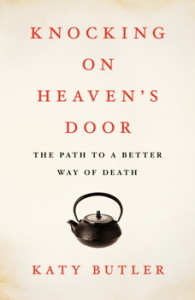A Case for Slower Medicine
A few days ago I met Katy Butler, author of Knocking on Heaven’s Door. Her revealing book about her elderly father’s slow death and her mother’s reaction to that – by learning to question doctors and, ultimately, choosing “less” – is a cautionary tale of too much medicine. The prose is elegant, and daughter’s point of view, graspable.
What emerges, through Butler’s voice about her parents’ ordeal, is anger. She tells of the pacemaker that was placed in her father’s heart. It kept him alive through multiple strokes and progressive debility. Her father’s protracted illness became a burden to her aging mother, who cared for her husband through thick and thin. Butler minds the costs of the procedure and doctors who, with seemingly little contemplation, inserted the device and billed for it. When her mother, in her eighties, became weak with heart valve problems, she opted not to have surgery. That was a triumph, Butler suggests – that her mother didn’t let the doctors take her heart, too.
And so she writes. There’s value in this intensely personal story. Because every day in hospitals patients receive treatments they don’t want, that they wouldn’t have selected if they had understood in advance what the consequences would or could be. Too many people, especially the elderly, die after they’ve had futile, intensive or just plainly aggressive care. Butler points to the pitfalls of a system that pays doctors to do procedures rather than to communicate.
Anger is an understandable reaction to a system that dehumanizes us (patients), that treats human bodies as containers of billable ailments and broken parts. I get that. But most of the many doctors I know go about their daily work with good intention – to heal. Plus, there’s a danger of underselling, or not choosing, care that could extend life, with good quality, for years or decades.
It’s not easy to reconcile the positions of over-treated patients and over-worked doctors. Some say the answer is in better medical education, in programs like narrative medicine, in patients’ gaining knowledge and asking more questions, or in revamping doctors’ payment incentives. I don’t see an easy solution from the doctors’ side, except for what’s obvious: practicing physicians need time to think, to contemplate the purpose of what they’re advising in each patient’s case. They should be paid for intellectual and communicative (non-PR) efforts. And they should learn, or be given enough minutes in each visit assigned, to hear, listen and respond to patients’ concerns.
The author of Knocking on Heaven’s Door, Katy Butler, mentioned that she’s eager to give grand rounds, to speak before doctors including cardiologists. She’d love to tell and teach them, and us, a thing or two.
Leave a Reply